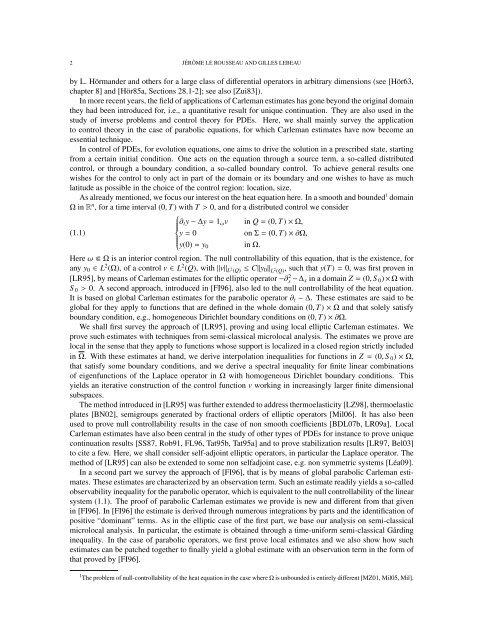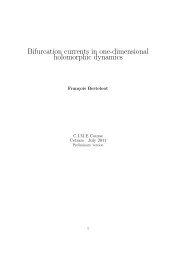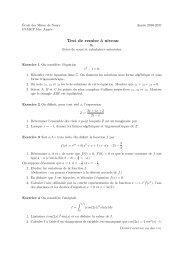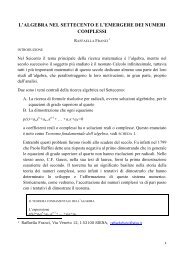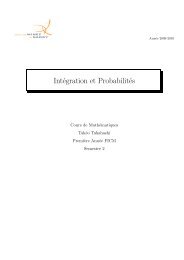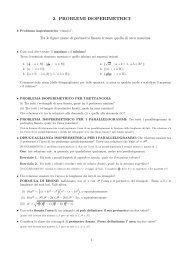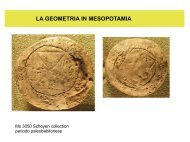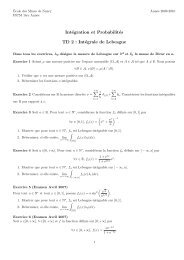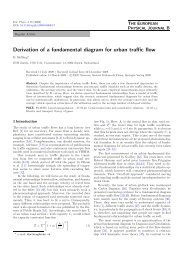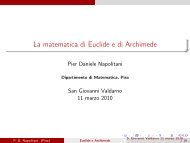on carleman estimates for elliptic and parabolic operators ...
on carleman estimates for elliptic and parabolic operators ...
on carleman estimates for elliptic and parabolic operators ...
You also want an ePaper? Increase the reach of your titles
YUMPU automatically turns print PDFs into web optimized ePapers that Google loves.
2 JÉRÔME LE ROUSSEAU AND GILLES LEBEAU<br />
by L. Hörm<strong>and</strong>er <strong>and</strong> others <strong>for</strong> a large class of differential <strong>operators</strong> in arbitrary dimensi<strong>on</strong>s (see [Hör63,<br />
chapter 8] <strong>and</strong> [Hör85a, Secti<strong>on</strong>s 28.1-2]; see also [Zui83]).<br />
In more recent years, the field of applicati<strong>on</strong>s of Carleman <strong>estimates</strong> has g<strong>on</strong>e bey<strong>on</strong>d the original domain<br />
they had been introduced <strong>for</strong>, i.e., a quantitative result <strong>for</strong> unique c<strong>on</strong>tinuati<strong>on</strong>. They are also used in the<br />
study of inverse problems <strong>and</strong> c<strong>on</strong>trol theory <strong>for</strong> PDEs. Here, we shall mainly survey the applicati<strong>on</strong><br />
to c<strong>on</strong>trol theory in the case of <strong>parabolic</strong> equati<strong>on</strong>s, <strong>for</strong> which Carleman <strong>estimates</strong> have now become an<br />
essential technique.<br />
In c<strong>on</strong>trol of PDEs, <strong>for</strong> evoluti<strong>on</strong> equati<strong>on</strong>s, <strong>on</strong>e aims to drive the soluti<strong>on</strong> in a prescribed state, starting<br />
from a certain initial c<strong>on</strong>diti<strong>on</strong>. One acts <strong>on</strong> the equati<strong>on</strong> through a source term, a so-called distributed<br />
c<strong>on</strong>trol, or through a boundary c<strong>on</strong>diti<strong>on</strong>, a so-called boundary c<strong>on</strong>trol. To achieve general results <strong>on</strong>e<br />
wishes <strong>for</strong> the c<strong>on</strong>trol to <strong>on</strong>ly act in part of the domain or its boundary <strong>and</strong> <strong>on</strong>e wishes to have as much<br />
latitude as possible in the choice of the c<strong>on</strong>trol regi<strong>on</strong>: locati<strong>on</strong>, size.<br />
As already menti<strong>on</strong>ed, we focus our interest <strong>on</strong> the heat equati<strong>on</strong> here. In a smooth <strong>and</strong> bounded 1 domain<br />
Ω in R n , <strong>for</strong> a time interval (0, T) with T > 0, <strong>and</strong> <strong>for</strong> a distributed c<strong>on</strong>trol we c<strong>on</strong>sider<br />
⎧<br />
∂ t y − ∆y = 1 ω v in Q = (0, T) × Ω,<br />
⎪⎨<br />
(1.1)<br />
y = 0<br />
<strong>on</strong> Σ = (0, T) × ∂Ω,<br />
⎪⎩ y(0) = y 0 in Ω.<br />
Here ω ⋐ Ω is an interior c<strong>on</strong>trol regi<strong>on</strong>. The null c<strong>on</strong>trollability of this equati<strong>on</strong>, that is the existence, <strong>for</strong><br />
any y 0 ∈ L 2 (Ω), of a c<strong>on</strong>trol v ∈ L 2 (Q), with ‖v‖ L 2 (Q) ≤ C‖y 0 ‖ L 2 (Q), such that y(T) = 0, was first proven in<br />
[LR95], by means of Carleman <strong>estimates</strong> <strong>for</strong> the <strong>elliptic</strong> operator −∂ 2 s − ∆ x in a domain Z = (0, S 0 ) × Ω with<br />
S 0 > 0. A sec<strong>on</strong>d approach, introduced in [FI96], also led to the null c<strong>on</strong>trollability of the heat equati<strong>on</strong>.<br />
It is based <strong>on</strong> global Carleman <strong>estimates</strong> <strong>for</strong> the <strong>parabolic</strong> operator ∂ t − ∆. These <strong>estimates</strong> are said to be<br />
global <strong>for</strong> they apply to functi<strong>on</strong>s that are defined in the whole domain (0, T) × Ω <strong>and</strong> that solely satisfy<br />
boundary c<strong>on</strong>diti<strong>on</strong>, e.g., homogeneous Dirichlet boundary c<strong>on</strong>diti<strong>on</strong>s <strong>on</strong> (0, T) × ∂Ω.<br />
We shall first survey the approach of [LR95], proving <strong>and</strong> using local <strong>elliptic</strong> Carleman <strong>estimates</strong>. We<br />
prove such <strong>estimates</strong> with techniques from semi-classical microlocal analysis. The <strong>estimates</strong> we prove are<br />
local in the sense that they apply to functi<strong>on</strong>s whose support is localized in a closed regi<strong>on</strong> strictly included<br />
in Ω. With these <strong>estimates</strong> at h<strong>and</strong>, we derive interpolati<strong>on</strong> inequalities <strong>for</strong> functi<strong>on</strong>s in Z = (0, S 0 ) × Ω,<br />
that satisfy some boundary c<strong>on</strong>diti<strong>on</strong>s, <strong>and</strong> we derive a spectral inequality <strong>for</strong> finite linear combinati<strong>on</strong>s<br />
of eigenfuncti<strong>on</strong>s of the Laplace operator in Ω with homogeneous Dirichlet boundary c<strong>on</strong>diti<strong>on</strong>s. This<br />
yields an iterative c<strong>on</strong>structi<strong>on</strong> of the c<strong>on</strong>trol functi<strong>on</strong> v working in increasingly larger finite dimensi<strong>on</strong>al<br />
subspaces.<br />
The method introduced in [LR95] was further extended to address thermoelasticity [LZ98], thermoelastic<br />
plates [BN02], semigroups generated by fracti<strong>on</strong>al orders of <strong>elliptic</strong> <strong>operators</strong> [Mil06]. It has also been<br />
used to prove null c<strong>on</strong>trollability results in the case of n<strong>on</strong> smooth coefficients [BDL07b, LR09a]. Local<br />
Carleman <strong>estimates</strong> have also been central in the study of other types of PDEs <strong>for</strong> instance to prove unique<br />
c<strong>on</strong>tinuati<strong>on</strong> results [SS87, Rob91, FL96, Tat95b, Tat95a] <strong>and</strong> to prove stabilizati<strong>on</strong> results [LR97, Bel03]<br />
to cite a few. Here, we shall c<strong>on</strong>sider self-adjoint <strong>elliptic</strong> <strong>operators</strong>, in particular the Laplace operator. The<br />
method of [LR95] can also be extended to some n<strong>on</strong> selfadjoint case, e.g. n<strong>on</strong> symmetric systems [Léa09].<br />
In a sec<strong>on</strong>d part we survey the approach of [FI96], that is by means of global <strong>parabolic</strong> Carleman <strong>estimates</strong>.<br />
These <strong>estimates</strong> are characterized by an observati<strong>on</strong> term. Such an estimate readily yields a so-called<br />
observability inequality <strong>for</strong> the <strong>parabolic</strong> operator, which is equivalent to the null c<strong>on</strong>trollability of the linear<br />
system (1.1). The proof of <strong>parabolic</strong> Carleman <strong>estimates</strong> we provide is new <strong>and</strong> different from that given<br />
in [FI96]. In [FI96] the estimate is derived through numerous integrati<strong>on</strong>s by parts <strong>and</strong> the identificati<strong>on</strong> of<br />
positive “dominant” terms. As in the <strong>elliptic</strong> case of the first part, we base our analysis <strong>on</strong> semi-classical<br />
microlocal analysis. In particular, the estimate is obtained through a time-uni<strong>for</strong>m semi-classical Gårding<br />
inequality. In the case of <strong>parabolic</strong> <strong>operators</strong>, we first prove local <strong>estimates</strong> <strong>and</strong> we also show how such<br />
<strong>estimates</strong> can be patched together to finally yield a global estimate with an observati<strong>on</strong> term in the <strong>for</strong>m of<br />
that proved by [FI96].<br />
1 The problem of null-c<strong>on</strong>trollability of the heat equati<strong>on</strong> in the case where Ω is unbounded is entirely different [MZ01, Mil05, Mil].


